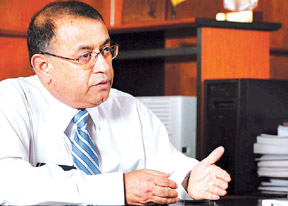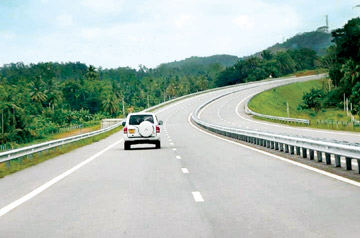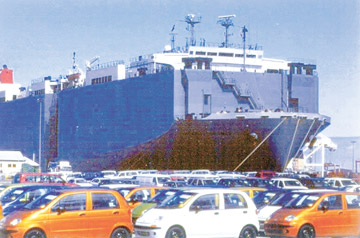|
Reduction in levels of poverty, income inequality:
Well-planned strategies boost economic growth
By Shirajiv SIRIMANE
Sri Lanka is looking at the possibility of attracting a record two
billion US dollars in foreign direct investments to the country. The
island is also looking at tourist arrival figures of one million and one
million US dollars in revenue. One of the main reasons to set up these
high goals is the dawn of peace which was achieved through the world’s
biggest humanitarian operation which has baffled many countries that
have been fighting terrorism for over three decades.
|

Dr. P.B. Jayasundera |
In a bid to support the achieving of this target, the Government is
providing infrastructure in the form of highways, international
harbours, airports and many other facilities. One of the other key
points that drove away investors from Sri Lanka was the power
interruptions. Today a permanent solution has been found for this
problem too with Sri Lanka being the only country in the region to
provide an uninterrupted power supply.
The development of the North and the East would attract the Tamil
Diaspora who remained out of the country for more than three decades. In
the first quarter of 2012, the Board of Investment (BOI) received 72 new
applications compared to the 28 in the corresponding period of the
previous year. There were also five applications for the expansion of
existing projects.
In the first quarter of 2012, the BOI granted approval for 54
projects against 27 in the first quarter of 2011.
This was a 100 percent increase over the previous year. The estimated
investment of those approved projects was Rs. 96,317 million of which a
total of Rs. 49,169 million is expected as foreign investment and the
balance Rs. 47,148 million as domestic investments. These approved
projects would create 9,500 new employment opportunities.
The BOI signed 40 project agreements in the first quarter of 2012
which includes 33 new enterprises and seven project expansions. This was
a 25 percent increase from the 32 agreements signed in the corresponding
period in 2011.
|
 |
|
Southern Expressway |
|

Cars unloaded at Hambantota Port |
During the period under review, 23 projects started implementation,
all of which were new projects. It’s a 64 percent increase compared with
the new projects starting implementation in the first quarter of 2011.
The estimated value of the investment from companies that commenced
implementation is Rs. 75,273 million. They will create 2,946 employment
opportunities.
Commercial operations
During the period under review, 18 enterprises commenced commercial
operations against 20 in the corresponding period in 2011.The estimated
investment value of these 18 enterprises is Rs. 7,198 million compared
to 3,089 in the first quarter 2011. These enterprises are expected to
create over 5,000 employment opportunities.
Total exports made by enterprises under the BOI during the first
quarter of 2012 amounts to Rs. 193 billion, a seven percent increase
over the corresponding period in 2011.
The total of BOI companies during the period under review amounts to
Rs 131 billion of which Rs. 93 billion consists of capital goods and Rs.
37 billion consists of raw material.
The total imports by BOI companies show a 22 percent increase
compared to the previous year (i.e. Rs. 107 billion). In terms of
capital goods, a 2.5-fold increase is evident.
Secretary to the Treasury Dr. P.B. Jayasundera, presenting the
Central Bank annual report,said that the planned strategies for the
future have accelerated economic growth in GDP to eight percent, with a
reduction in poverty and income inequality. Social indicators too have
improved.
“The development strategies specifically targeted to integrate
conflict-affected areas with the rest of the economy towards achieving a
rapid economic progress and national reconciliation, have made
significant progress.
The conflict affected areas have been made ‘mine free’. Displaced
people have been fully resettled. The progress made island-wide in
infrastructure development has created a new investment climate
favourable for rapid private investment.
The Government has sustained an annual public investment of six
percent of GDP,” he said.
Financial sector stability and efforts to contain the fiscal deficit
below seven percent of GDP by 2011 are conducive to sustain a stable
macroeconomic environment. The reduction in unemployment, rising wages
and emerging new growth areas have shifted the economy towards
skills-focused employment.
“A well-focused development strategy to raise exports and reduce
imports needs to be put in place” he said and urged the private sector
to manufacture more goods,in Sri Lanka as the last budget gave
concessions in this regard.
The first Five-Year Development Framework 2006-2010
The five year period ending in 2010 achieved many development
outcomes in the midst of the conflict in the North that prevailed till
mid-2009, the global food crisis, volatile oil prices and financial
uncertainties in advanced countries. The salient development outcomes
are summarised below;
* Per capita income, measured in terms of national accounts as well
as household income reflected in the periodic household surveys,
indicates a steady increase in income between 2005 and 2011.
*Income inequality declined at national level as well as at
provincial level in response to income growth, rural development
initiatives and a decline in unemployment. Income distribution reported
a reduction in the gap between various income groups.
* The trends in poverty indicators point to a marked improvement in
poverty reduction in response to economic growth.
* Post-2005 development marked a massive improvement in access of the
population to basic infrastructure.
* Economic growth has been associated with new employment
opportunities, productivity growth and high wage income. Industrial
disputes and the number of strikes declined to a record low level from
2005.
* Expanded facilities in education across the country continued to
sustain a higher general literacy as well as school enrolment.
* Public expenditure on health expanded due to increased deployment
of doctors, nurses and other support staff to maintain islandwide health
services. Improvements were made to hospitals and the provision of
equipment and other related facilities also widened. Preventive
healthcare to address concerns relating to communicable diseases had
been a priority. The progressive decline in maternal and infant
mortality rates as well as the continued rise in life expectancy show
that the country is on track in terms of the Millennium Development
Goals.
* The fiscal policy strategy of the Government is designed to
generate a revenue surplus by adopting expenditure management measures
to economise operational expenditure and to improve government revenue
through broadbasing the revenue collection. The Government follows a
rolling three year medium-term plan to bring down the fiscal deficit to
about five percent and the public debt level to below 70 percent in
relation to GDP. The protection of public investment at six percent of
GDP and sustaining social spending on education, health, rural
development and welfare is the main thrust of this adjustment strategy
as it supports growth and poverty reduction.
* The Government adopted measures to increase food production through
its agriculture development initiatives and promoting household level
activities in food production. Food inflation declined to a
significantly low level in 2010/11. Import replacement initiatives
through domestic food production programs have continued and the budget
deficit has been contained. Combined effects of these supply and demand
management measures have led to a decline in inflation to a single digit
level during the last three years. The country attained self-sufficiency
in rice production.
The Government has placed the country on a major food production
drive to improve availability of food, vegetables, coconut, milk, and
poultry to achieve food security and price stability.
* The expansion in export earnings suffered a major setback in 2009
with a loss of one billion US dollars, but bounced back thereafter with
an annual growth of 22 percent per year. Maintaining such a high growth
is expected with investment in further value addition to export products
as well by entering new markets. Remittance income which was only 20
percent of exports in 2000 increased to US$ 5,145 million in 2011 which
accounts for 50 percent of exports. The prospects of raising such income
by at least a billion US dollars each year to make it a US$ 10 billion
activity, have improved.
* The post-conflict development phase commencing from 2009 has
improved prospects of exploiting the full potential of Sri Lanka’s
tourism resources. The country is expected to earn over one billion US
dollars in 2012 and double such earnings in five years. Tourism is
expected to drive both foreign and domestic investments in the medium
term.
* The port, aviation and other professional services is expected to
be a major foreign earning source in the medium term with an expansion
in port and aviation services on which the Government has promoted
investment by both private and public sectors. The new port terminals in
Colombo and Hambantota are expected to attract significant global
trade-based activities in Sri Lanka.
* The debt market and equity market improved to new dimensions in
2010/11 following the previous low volume operations, with the equity
market capitalisation reaching 40 percent of GDP, a sizable volume
reflecting the depth of the economy.
|

